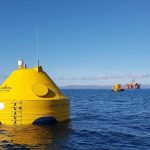Has Portugal been sidestepped in Iberia energy deal?
Spain, France and Portugal have abandoned the MidCat gas interconnected project and have agreed on a green energy gas corridor.
A new gas pipeline will link Barcelona to Marseille, Spain’s Prime Minister, Pedro Sanches announced on Thursday.
“We have reached an agreement to replace the MidCat project with a new project called the green energy corridor that will link the Iberian Peninsula to France and therefore to the European energy market,” Sanchez told reporters in Brussels as he arrived for an EU summit following a meeting with his Portuguese counterpart Antonio Costa and French President Emmanuel Macron.
“It will be a pipeline to transport green hydrogen but also gas, during the transition, to supply the European market,” EFE News reported.
A joint statement adopted by the three countries said the new BarMar pipeline is “the most direct and efficient option to link the Iberian peninsula to Central Europe”.
The new “green energy corridor” will also include electricity interconnections, with an “acceleration of efforts” to finalise construction of a new subsea cable linking France and Spain via the Bay of Biscay on the Atlantic coast.
After hours of negotiations, the outcome of the two-day meeting of EU leaders did not deliver any clear agreement on whether and how to limit gas prices to reduce soaring bills in the bloc.
Nevertheless, some leaders feel that EU energy ministers will be able to agree on a package of emergency measures in the next weeks.
Last month Portugal’s Prime Minister Antonio Costa urged France to stop blocking the proposed MidCat gas pipeline across the Pyrenees, noting it would help central and eastern Europe wean themselves off of Russian gas.
Spain and Portugal have seven liquefied natural gas terminals that could supply central Europe via additional pipelines such as the proposed Spain-to-France MidCat pipeline.
Last week after the meeting, António Costa spoke of a “general satisfaction” among the members of the European Council regarding the agreement reached.
“This project is not so different, but it is also a project with greater economic value for Portugal”, he said at the end of the European summit in Brussels which ended on Friday.
However, Euro MP Paulo Rangel criticised the deal that António Costa has signed up to saying: “We have exchanged the value of our renewables for a dish of lentils.”
He meant that signing the agreement with France and Spain essentially sold Portugal down the river, putting at risk the potential fruits of Portugal’s €23Bn long-term investment at the Port of Sines near Setúbal to transport liquefied natural gas to the rest of Europe, undermining its strategic importance as a port.
“France has won in terms of electricity and nuclear energy, Portugal has lost in terms of nuclear. In gas, Spain and the Port of Barcelona had come out the winner, while Portugal and the Port of Sines had lost out”.










